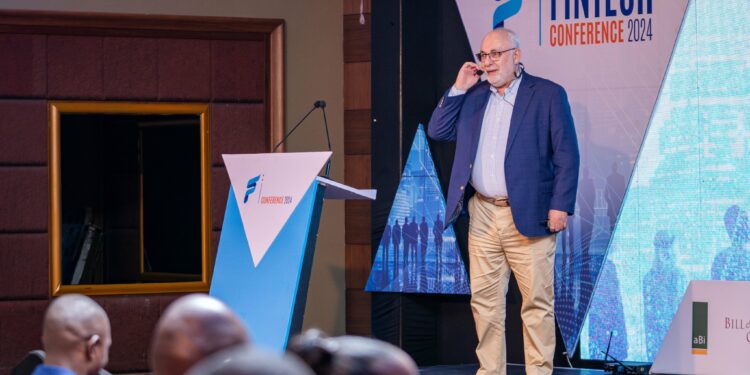At the 6th FITSPA Annual FinTech Conference 2024 held at Sheraton Hotel Kampala, keynote speaker David Birch delivered a forward-looking and thought-provoking address on the transformative role of Artificial intelligence (AI) in financial services.
Birch the Global Ambassador for Consult Hyperion and an author known for his deep insights into the intersection of technology and finance, painted a vivid picture of how artificial intelligence is set to reshape the industry and much sooner than many realize.
While making his speech he began by highlighting the current state of AI in practical applications. Where he emphasized that AI has already surpassed human abilities in certain fields, particularly in highly specialized tasks like medical diagnostics.
“A lot of those things right now, we still have the situation where, you know, if you have your X-ray, and your X-ray shows some anomaly and the computer say yes, ‘We think this might be cancer,’ you still have to give it to a human doctor to double-check it. But that’s what’s going next.” Birch’s message was clear: human oversight is becoming less necessary in these contexts as AI becomes more capable.
The keynote took a serious turn when Birch discussed the speed at which AI is improving. To illustrate this, he referred to the ubiquitous CAPTCHA tests that ask users to identify objects like bicycles or stairs to prove they’re human.
Birch noted that AI can now outperform humans in these tasks. “The robots are already better. On average, they can solve those four seconds quicker than people can. So, if you’re using one of those systems to keep the robots out, I have to tell you, the robots are already inside your perimeter.”
Birch shifted focus to the financial sector, where AI is expected to have its most significant impact. He stressed that AI is not just a tool to cut costs, but a transformative force that could fundamentally alter the infrastructure of financial services.
“Financial services, it’s particularly important. The reason is that these are heavily regulated businesses, and that means they have expensive infrastructure. If it turns out that we can use AI to provide some of those infrastructural services to that same degree of regulation, we can make significant cost reductions.” According to Birch, the potential cost savings could be dramatic, with compliance costs alone being slashed by as much as 70 percent.
However, Birch cautioned that AI must be implemented carefully, particularly when interacting with customers. He took a direct jab at the overreliance on tools like ChatGPT, explaining that while the technology is impressive, it has flaws that make it unsuitable for high-stakes environments like banking.
“You can’t just get ChatGPT and tell it to talk to customers, right? Because, first of all, ChatGPT makes things up. It’s called hallucinations. That’s the polite word for it. But I call it bullshit. You can’t just make things up. You’ll end up getting fined by the regulators,” he warned.
Despite the cautionary tone, Birch emphasized that businesses are underestimating the scope of AI disruption. He argued that the real revolution will come not from banks adopting AI, but from customers having access to AI tools. “This is the most disruptive technology in our lifetime, and you think it’s going to disrupt the industry by making slightly better credit decisions? That’s deluded. That’s bank thinking. That’s not real thinking.”
Birch detailed how AI could upend traditional business models, particularly in retail banking. He explained that a significant portion of bank profits comes from what he described as “inertial” income money that customers don’t move around to better financial products simply because they don’t have the time or energy to do so. “Bots don’t have better things to do. Bots can do that all day long. There’s an immediate threat to retail bank profit pools simply from the inertial.”
He took the example further by describing how AI could manage mundane financial decisions, such as which payment method to use for everyday transactions. While most people don’t think about whether to use a credit card for frequent flyer miles or a debit card for hotel rewards points, Birch explained that bots can handle these choices effortlessly. “Normal people don’t have the brainpower or bandwidth to think about that sort of thing, but bots do.”
For businesses, this raises a fundamental challenge: how to market and sell services in a world where AI bots not people make purchasing decisions. “If I’m going to be a successful FinTech in that space, how am I going to sell things to bots, not to customers? Bots don’t care about your brand or what logo you choose. Bots don’t care about any of that stuff.”
In Birch’s view, financial education is an inefficient and costly endeavor. He argued that instead of investing in educating people about complex financial matters, it would be more effective to develop AI tools that handle those decisions. “Why would you spend money on financial education when you could just get bots to do it for them?”
Finally, Birch touched on the growing importance of distinguishing between human and AI interactions, particularly as AI becomes a more common player in the market. “It becomes really important to know whether you’re dealing with a person or whether you’re dealing with a robot. Right now, we have no idea.”
Meanwhile, Birch’s message to Uganda’s FinTech community was clear: the AI revolution is not just about automating call centers or making incremental improvements to existing processes.
It is about a fundamental shift in how financial services operate and how customers interact with them. Businesses that fail to recognize the scale of this disruption risk being left behind. “Whatever you think about the extent of the disruption, you’re wrong. You’re not thinking enough.”
Do you have a story in your community or an opinion to share with us: Email us at editorial@watchdoguganda.com














